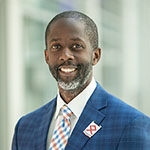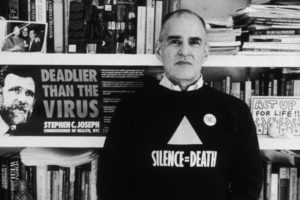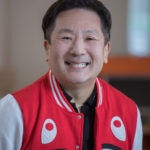There is a reckoning coming to America about its legacy of racism. However, it is not limited to the police. This reckoning is about the systemic racism that impacts all facets of society, including the HIV movement. Unfortunately, HIV disproportionately impacts people of color, people with trans experience, black women, and gay men. How do we build an antiracist HIV movement that is committed to Black Lives Matter?
 This weekend I joined thousands of people who protested on the streets of DC. Walking with my mask, I was amazed at the diversity. Families of all races, all genders, and all sexual orientations came together in a peaceful protest. It was actually more like a celebration. People were dancing, drumming, singing, and chanting. There were no leaders, just concerned citizens who felt compelled to make their voices heard, even in the middle of COVID-19. I heard one father explain to his child that they were there to witness history and to fight to make the world a better place.
This weekend I joined thousands of people who protested on the streets of DC. Walking with my mask, I was amazed at the diversity. Families of all races, all genders, and all sexual orientations came together in a peaceful protest. It was actually more like a celebration. People were dancing, drumming, singing, and chanting. There were no leaders, just concerned citizens who felt compelled to make their voices heard, even in the middle of COVID-19. I heard one father explain to his child that they were there to witness history and to fight to make the world a better place.

 I just so happened to arrive when DC Mayor Muriel Bowser stepped on to Black Lives Matter Plaza. It was an honor to see her amazing protest art in front of the White House. Her leadership as a Black woman at this critical moment added to the peaceful and celebratory nature of the protests. She was a rock star and I honor her vision, strength, and courage to step up and be heard. I also loved that her mask matched her t-shirt.
I just so happened to arrive when DC Mayor Muriel Bowser stepped on to Black Lives Matter Plaza. It was an honor to see her amazing protest art in front of the White House. Her leadership as a Black woman at this critical moment added to the peaceful and celebratory nature of the protests. She was a rock star and I honor her vision, strength, and courage to step up and be heard. I also loved that her mask matched her t-shirt.
The HIV movement, like the rest of the world, has some serious soul searching to do. What does it mean for us to be an antiracist movement that is committed to Black Lives Matter? This is the challenge not only for community-based organizations, but also for health departments, health centers, national organizations, and federal agencies. We want to end the HIV epidemic that is overwhelmingly impacting people of color, yet so many of the top leadership positions are held by White people. I’m not saying fire all the White people, but I am asking leadership to work to end racism and to stand in solidarity with Black Lives Matter.
Fifty-seven jurisdictions are about to implement plans to end the epidemic in their regions. Will the plans address the racial dynamic that impacts HIV prevention, care, treatment, and wrap around services? White privilege is thinking you know the answers for communities that you cannot even begin to understand. This is not to say that all white people are racist; however, the reckoning is about all white people and the role they play in fighting or perpetuating racist systems. Only white people can end racism because all of the systems and power are built and maintained upon their privilege.








That is the double edged sword: why would anyone want to dismantle systems that are set-up to benefit them? Maybe because those systems are wrong. Just ask the family and loved ones of George Floyd, Breonna Taylor, Ahmaud Arbery, Christian Cooper, Dustin Parker, Neulisa Luciano Ruiz, Vampi Mendez Arocho, Monika Diamond, Lexi, Johanna Metzger, Serena Angelique Velazquez Ramos, Layla Pelaez Sanchez, Penelope Diaz Ramirez, Nina Pop, Helle Jae O’Regan, or Tony McDade.
The world is on fire. Ask yourself: are you the gasoline or the water? Thank you for your declarations of support, but that is just the first step. Now the real work begins. I challenge health departments, community-based organizations, health centers, national organizations, and federal agencies to create and implement strategic plans to make their institutions antiracist.
 One important step, especially during these difficult financial times, is to hire people of color, people of trans experience, Black women, and gay men. Our movement is about to experience the largest influx of new funding in the last two decades. Thousands of new people will be hired to carry out the various programs to end the HIV epidemic. Hire people who live in and are part of the communities our work hopes to reach. Employment is a critical social determinant of health and an important step towards racial justice.
One important step, especially during these difficult financial times, is to hire people of color, people of trans experience, Black women, and gay men. Our movement is about to experience the largest influx of new funding in the last two decades. Thousands of new people will be hired to carry out the various programs to end the HIV epidemic. Hire people who live in and are part of the communities our work hopes to reach. Employment is a critical social determinant of health and an important step towards racial justice.
Talk to me in two weeks, after I find out if I got COVID-19. This was a very personal decision and definitely not the right one for most people, especially people who are immune compromised. I support everyone’s right to protest or stay home and understand both sides equally. NMAC is proud to lead with race to end the HIV epidemic.
NMAC





 When Ron transitioned last week, we lost one of our greatest heroes ever to lead the HIV movement. He made an indelible mark. As an educator, he taught us about the historical legacy of African LGBTQ+ people as integral leaders within their communities. As an advocate, Dr. Simmons reminded us to view the world with our whole selves by not solely focusing on Black-only or LGBTQ-only issues. As a leader, Ron encouraged us to find a way to support each other against all odds.
When Ron transitioned last week, we lost one of our greatest heroes ever to lead the HIV movement. He made an indelible mark. As an educator, he taught us about the historical legacy of African LGBTQ+ people as integral leaders within their communities. As an advocate, Dr. Simmons reminded us to view the world with our whole selves by not solely focusing on Black-only or LGBTQ-only issues. As a leader, Ron encouraged us to find a way to support each other against all odds.
 This is America. Black children are being taught to prepare for a covert war that they have no desire to wage. Black children are being taught that their schools are not as good. Black children are being taught that they must be thrice as good to have half as much. Black children are love.
This is America. Black children are being taught to prepare for a covert war that they have no desire to wage. Black children are being taught that their schools are not as good. Black children are being taught that they must be thrice as good to have half as much. Black children are love.
 In 1993, NMAC held its first sit-down dinner/fundraiser in the Library of Congress called Our Place at The Table. It was a glamorous affair by NMAC’s standards. We honored the new Secretary of Health and Human Services Donna Shalala and celebrated the election of President Bill Clinton. There were waiters who passed hors d’oeuvres and a three course sit down dinner that would end with a speech by the new Secretary. About a week before the dinner I get a call from Larry who is screaming “how dare we honor Shalala. She has done nothing to help our community.”
In 1993, NMAC held its first sit-down dinner/fundraiser in the Library of Congress called Our Place at The Table. It was a glamorous affair by NMAC’s standards. We honored the new Secretary of Health and Human Services Donna Shalala and celebrated the election of President Bill Clinton. There were waiters who passed hors d’oeuvres and a three course sit down dinner that would end with a speech by the new Secretary. About a week before the dinner I get a call from Larry who is screaming “how dare we honor Shalala. She has done nothing to help our community.” In 2018, Larry was going to keynote the Opening Plenary at USCA in Orlando. Unfortunately, his health was failing. As a result, he said he would send a video message. Two days before the conference was to start, I get this 60-minute video from him. The plenary was already too long, so I decided to play the first 20 minutes.
In 2018, Larry was going to keynote the Opening Plenary at USCA in Orlando. Unfortunately, his health was failing. As a result, he said he would send a video message. Two days before the conference was to start, I get this 60-minute video from him. The plenary was already too long, so I decided to play the first 20 minutes.


 Understanding when and how to re-open is particularly challenging for HIV organizations. Our clients and/or staff could be immune compromised. Not everyone can achieve an undetectable viral load. As the data has shown, people of color are particularly hard hit by both HIV and COVID-19. Please join me for my first Instagram Live conversation with
Understanding when and how to re-open is particularly challenging for HIV organizations. Our clients and/or staff could be immune compromised. Not everyone can achieve an undetectable viral load. As the data has shown, people of color are particularly hard hit by both HIV and COVID-19. Please join me for my first Instagram Live conversation with 
 Alina Duarte, periodista independiente, DC– El racismo institucionalizado perpetúa el que las comunidades de inmigrantes sean mantenidas en el margen. Alina presentará cómo esto ha causado un efecto dispar dentro de la pandemia a la vez que muestra estrategias que han demostrado ser efectivas.
Alina Duarte, periodista independiente, DC– El racismo institucionalizado perpetúa el que las comunidades de inmigrantes sean mantenidas en el margen. Alina presentará cómo esto ha causado un efecto dispar dentro de la pandemia a la vez que muestra estrategias que han demostrado ser efectivas. José Romero, Latino Commission on AIDS, NC– El peligro de la deportación al momento de buscar servicios es una de las barreras principales que enfrentan las comunidades de inmigrantes en los Estados Unidos. Por esta razón, José Romero hablará sobre cuáles son los derechos de estas poblaciones y qué pueden hacer para continuar con el cuidado de la salud.
José Romero, Latino Commission on AIDS, NC– El peligro de la deportación al momento de buscar servicios es una de las barreras principales que enfrentan las comunidades de inmigrantes en los Estados Unidos. Por esta razón, José Romero hablará sobre cuáles son los derechos de estas poblaciones y qué pueden hacer para continuar con el cuidado de la salud. Anandrea Molina, Organización Latina Trans en Texas, TX– Poblaciones ya desventajadas son puestas en situaciones de riesgo aún mayores en eventos de crisis como los actuales. Por esto, Anandrea expondrá las desigualdades hacia las comunidades trans en el sur de los Estados Unidos y cuáles son las herramientas que tienen para enfrentarlas.
Anandrea Molina, Organización Latina Trans en Texas, TX– Poblaciones ya desventajadas son puestas en situaciones de riesgo aún mayores en eventos de crisis como los actuales. Por esto, Anandrea expondrá las desigualdades hacia las comunidades trans en el sur de los Estados Unidos y cuáles son las herramientas que tienen para enfrentarlas.
 Today is
Today is